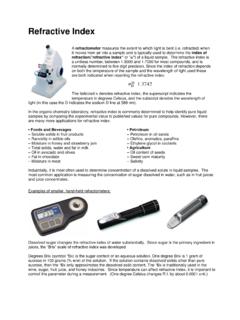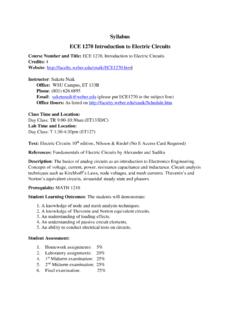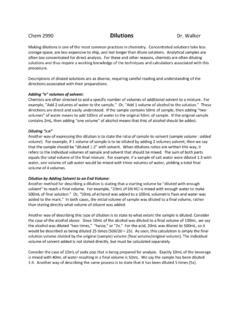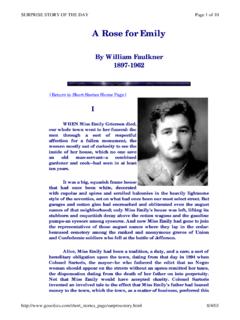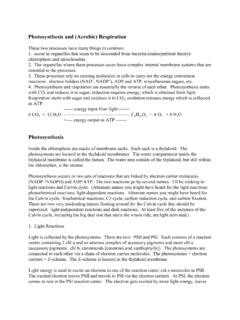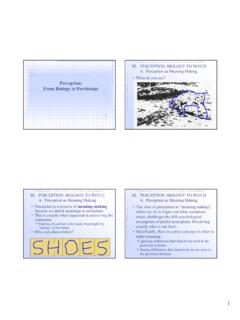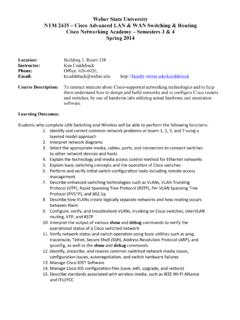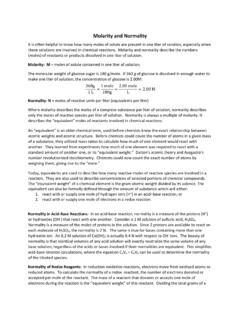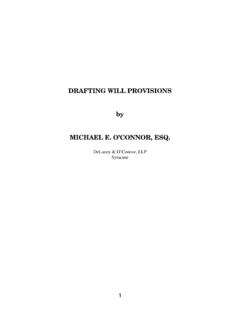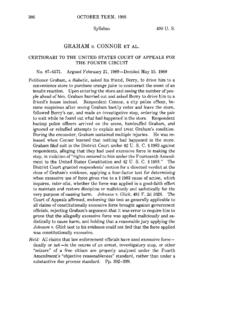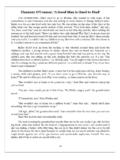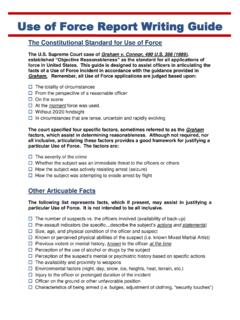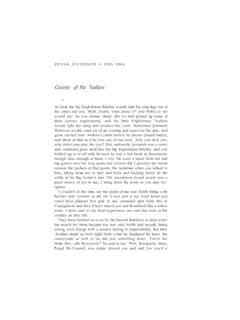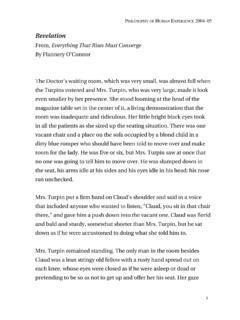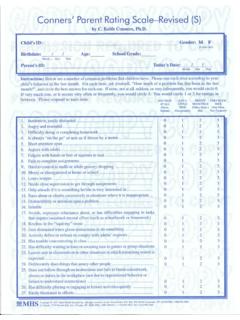Transcription of Good Country People - Weber State University
1 Good Country People By Flannery O'Connor 1925-1964 |Return to Short Stories Home Page| Besides the neutral expression that she wore when she was alone, Mrs. Freeman had two others, forward and reverse, that she used for all her human dealings. Her forward expression was steady and driving like the advance of a heavy truck. Her eyes never swerved to left or right but turned as the story turned as if they followed a yellow line down the center of it. She seldom used the other expression because it was not often necessary for her to retract a statement, but when she did, her face came to a complete stop, there was an almost imperceptible movement of her black eyes, during which they seemed to be receding, and then the observer would see that Mrs.
2 Freeman, though she might stand there as real as several grain sacks thrown on top of each other, was no longer there in spirit. As for getting anything across to her when this was the case, Mrs. Hopewell had given it up. She might talk her head off. Mrs. Freeman could never be brought to admit herself wrong to any point. She would stand there and if she could be brought to say anything, it was something like, Well, I wouldn t of said it was and I wouldn t of said it wasn t or letting her gaze range over the top kitchen shelf where there was an assortment of dusty bottles, she might remark, I see you ain t ate many of them figs you put up last summer.
3 They carried on their most important business in the kitchen at breakfast. Every morning Mrs. Hopewell got up at seven o clock and lit her gas heater and Joy s. Joy was her daughter, a large blonds girl who had an artificial leg. Mrs. Hopewell thought of her as a child though she was thirty-two years old and highly educated. Joy would get up while her mother was eating and lumber into the bathroom and slam the door, and before long, Mrs. Freeman would arrive at the back door.
4 Joy would hear her mother call, Come on in, and then they would talk for a while in low voices that were indistinguishable in the bathroom. By the time Joy came in, they had usually finished the weather report and were on one or the other of Mrs. Freeman s daughters, Glynese or Carramae. Joy called Page 1 of 19 Good Country People by Flannery O'Connor8/4/03 Glycerin and Caramel. Glynese, a redhead, was eighteen and had many admirers; Carramae, a blonde, was only fifteen but already married and pregnant.
5 She could not keep anything on her stomach. Every morning Mrs. Freeman told Mrs. Hopewell how many times she had vomited since the last report. Mrs. Hopewell liked to tell People that Glynese and Carramae were two of the finest girls she knew and that Mrs. Freeman was a lady and that she was never ashamed to take her anywhere or introduce her to anybody they might meet. Then she would tell how she had happened to hire the Freemans in the first place and how they were a godsend to her and how she had had them four years.
6 The reason for her keeping them so long was that they were not trash. They were good Country People . She had telephoned the man whose name they had given as reference and he had told her that Mr. Freeman was a good farmer but that his wife was the nosiest woman ever to walk the earth. She s got to be into everything, the man said. If she don t get there before the dust settles, you can bet she s dead, that s all. She ll want to know all your business. I can stand him real good, he had said, but me nor my wife neither could have stood that woman one more minute on this place.
7 That had put Mrs. Hopewell off for a few days. She had hired them in the end because there were no other applicants but she had made up her mind beforehand exactly how she would handle the woman. Since she was the type who had to be into everything, then, Mrs. Hopewell had decided, she would not only let her be into everything, she would see to it that she was into everything she would give her the responsibility of everything, she would put her in charge. Mrs. Hopewell had no bad qualities of her own but she was able to use other People s in such a constructive way that she had kept them four years.
8 Nothing is perfect. This was one of Mrs. Hopewell s favorite sayings. Another was: that is life! And still another, the most important, was: well, other People have their opinions too. She would make these statements, usually at the table, in a tone of gentle insistence as if no one held them but her, and the large hulking Joy, whose constant outrage had obliterated every expression from her face, would stare just a little to the side of her, her eyes icy blue, with the look of someone who had achieved blindness by an act of will and means to keep it.
9 When Mrs. Hopewell said to Mrs. Freeman that life was like that, Mrs. Freeman would say, I always said so myself. Nothing had been arrived at by anyone that had not first been arrived at by her. She was quicker than Mr. Freeman. When Mrs. Hopewell said to her after they had been on the place for a while, You know, you re the wheel behind the wheel, and winked, Mrs. Freeman had said, I know it. I ve always been quick. It s some that are quicker than others. Page 2 of 19 Good Country People by Flannery O'Connor8/4/03 Everybody is different, Mrs.
10 Hopewell said. Yes, most People is, Mrs. Freeman said. It takes all kinds to make the world. I always said it did myself. The girl was used to this kind of dialogue for breakfast and more of it for dinner; sometimes they had it for supper too. When they had no guest they ate in the kitchen because that was easier. Mrs. Freeman always managed to arrive at some point during the meal and to watch them finish it. She would stand in the doorway if it were summer but in the winter she would stand with one elbow on top of the refrigerator and look down at them, or she would stand by the gas heater, lifting the back of her skirt slightly.
